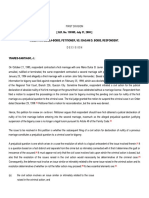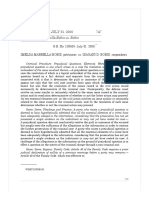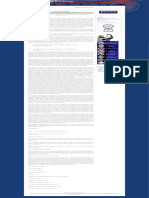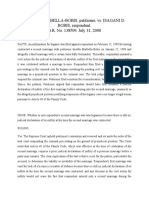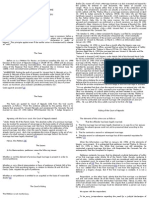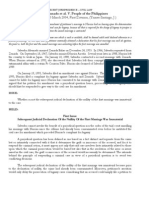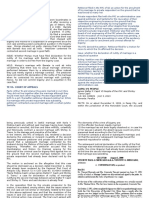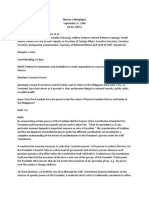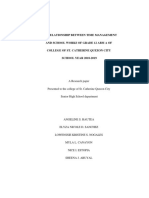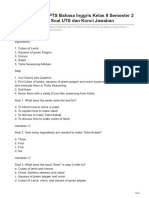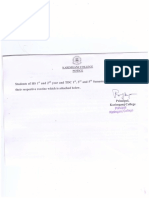Case Digest Marbella-Bobis V. Bobis
Case Digest Marbella-Bobis V. Bobis
Uploaded by
Jc IsidroCopyright:
Available Formats
Case Digest Marbella-Bobis V. Bobis
Case Digest Marbella-Bobis V. Bobis
Uploaded by
Jc IsidroOriginal Description:
Original Title
Copyright
Available Formats
Share this document
Did you find this document useful?
Is this content inappropriate?
Copyright:
Available Formats
Case Digest Marbella-Bobis V. Bobis
Case Digest Marbella-Bobis V. Bobis
Uploaded by
Jc IsidroCopyright:
Available Formats
CASE DIGEST
MARBELLA-BOBIS v. BOBIS
MARBELLA-BOBIS v. BOBIS
July 31, 2000 (G.R. No. 138509)
PARTIES:
Petitioner: IMELDA MARBELLA-BOBIS
Respondent: ISAGANI D. BOBIS
FACTS:
October 21, 1985, first marriage with one Maria Dulce B. Javier. Not annulled, nullified or terminated
January 25, 1996, second marriage with petitioner Imelda Marbella-Bobis
Third marriage with a certain Julia Sally Hernandez
February 25, 1998, Imelda Bobis filed bigamy
Sometime thereafter, respondent initiated a civil action for the judicial declaration of absolute nullity of his first marriage on the
ground that it was celebrated without a marriage license
Petitioner argues that respondent should have first obtained a judicial declaration of nullity of his first marriage before entering into
the second marriage
*After petitioner sued for bigamy, its just when the respondent filed a declaration of absolute nullity.
ISSUE:
Whether or not the subsequent filing of a civil action for declaration of nullity of a previous marriage constitutes a prejudicial question
to a criminal case for bigamy
HELD:
A prejudicial question is one which arises in a case the resolution of which is a logical antecedent of the issue involved therein.3It is a
question based on a fact distinct and separate from the crime but so intimately connected with it that it determines the guilt or
innocence of the accused. Its two essential elements are:
(a) the civil action involves an issue similar or intimately related to the issue raised in the criminal action; and
(b) the resolution of such issue determines whether or not the criminal action may proceed
In Article 40 of the Family Code, respondent, without first having obtained the judicial declaration of nullity of the first marriage,
cannot be said to have validly entered into the second marriage. In the current jurisprudence, a marriage though void still needs a
judicial declaration of such fact before any party can marry again; otherwise the second marriage will also be void. The reason is that,
without a judicial declaration of its nullity, the first marriage is presumed to be subsisting. In the case at bar, respondent was for all
legal intents and purposes regarded as a married man at the time he contracted his second marriage with petitioner.
Any decision in the civil action for nullity would not erase the fact that respondent entered into a second marriage during the
subsistence of a first marriage. Thus, a decision in the civil case is not essential to the determination of the criminal charge. It is,
therefore, not a prejudicial question
*Parties to a marriage should not be permitted to judge for themselves its nullity, only competent courts having such authority. Prior to
such declaration of nullity, the validity of the first marriage is beyond question. A party who contracts a second marriage then assumes
the risk of being prosecuted for bigamy (Landicho v. Relova)
FULL TEXT CASE
MARBELLA-BOBIS v. BOBIS
IMELDA MARBELLA-BOBIS, petitioner, vs. ISAGANI D. BOBIS, respondent.
DECISION
YNARES-SANTIAGO, J.:
On October 21, 1985, respondent contracted a first marriage with one Maria Dulce B. Javier. Without said marriage having been
annulled, nullified or terminated, the same respondent contracted a second marriage with petitioner Imelda Marbella-Bobis on
January 25, 1996 and allegedly a third marriage with a certain Julia Sally Hernandez. Based on petitioners complaint-affidavit, an
information for bigamy was filed against respondent on February 25, 1998, which was docketed as Criminal Case No. Q98-75611 of
the Regional Trial Court, Branch 226, Quezon City. Sometime thereafter, respondent initiated a civil action for the judicial declaration
of absolute nullity of his first marriage on the ground that it was celebrated without a marriage license. Respondent then filed a
motion to suspend the proceedings in the criminal case for bigamy invoking the pending civil case for nullity of the first marriage as a
prejudicial question to the criminal case. The trial judge granted the motion to suspend the criminal case in an Order dated December
29, 1998.[1] Petitioner filed a motion for reconsideration, but the same was denied.
Hence, this petition for review on certiorari. Petitioner argues that respondent should have first obtained a judicial declaration of
nullity of his first marriage before entering into the second marriage, inasmuch as the alleged prejudicial question justifying
suspension of the bigamy case is no longer a legal truism pursuant to Article 40 of the Family Code.[2]
The issue to be resolved in this petition is whether the subsequent filing of a civil action for declaration of nullity of a previous
marriage constitutes a prejudicial question to a criminal case for bigamy.
A prejudicial question is one which arises in a case the resolution of which is a logical antecedent of the issue involved therein.[3] It is
a question based on a fact distinct and separate from the crime but so intimately connected with it that it determines the guilt or
innocence of the accused.[4] It must appear not only that the civil case involves facts upon which the criminal action is based, but also
that the resolution of the issues raised in the civil action would necessarily be determinative of the criminal case.[5] Consequently, the
defense must involve an issue similar or intimately related to the same issue raised in the criminal action and its resolution
determinative of whether or not the latter action may proceed.[6] Its two essential elements are:[7]
(a) the civil action involves an issue similar or intimately related to the issue raised in the criminal action; and
(b) the resolution of such issue determines whether or not the criminal action may proceed.
A prejudicial question does not conclusively resolve the guilt or innocence of the accused but simply tests the sufficiency of the
allegations in the information in order to sustain the further prosecution of the criminal case. A party who raises a prejudicial question
is deemed to have hypothetically admitted that all the essential elements of a crime have been adequately alleged in the information,
considering that the prosecution has not yet presented a single evidence on the indictment or may not yet have rested its case. A
challenge of the allegations in the information on the ground of prejudicial question is in effect a question on the merits of the
criminal charge through a non-criminal suit.
Article 40 of the Family Code, which was effective at the time of celebration of the second marriage, requires a prior judicial
declaration of nullity of a previous marriage before a party may remarry. The clear implication of this is that it is not for the parties,
particularly the accused, to determine the validity or invalidity of the marriage.[8] Whether or not the first marriage was void for lack
of a license is a matter of defense because there is still no judicial declaration of its nullity at the time the second marriage was
contracted. It should be remembered that bigamy can successfully be prosecuted provided all its elements concur two of which are a
previous marriage and a subsequent marriage which would have been valid had it not been for the existence at the material time of
the first marriage.[9]
In the case at bar, respondents clear intent is to obtain a judicial declaration of nullity of his first marriage and thereafter to invoke
that very same judgment to prevent his prosecution for bigamy. He cannot have his cake and eat it too. Otherwise, all that an
adventurous bigamist has to do is to disregard Article 40 of the Family Code, contract a subsequent marriage and escape a bigamy
charge by simply claiming that the first marriage is void and that the subsequent marriage is equally void for lack of a prior judicial
declaration of nullity of the first. A party may even enter into a marriage aware of the absence of a requisite - usually the marriage
license - and thereafter contract a subsequent marriage without obtaining a declaration of nullity of the first on the assumption that
the first marriage is void. Such scenario would render nugatory the provisions on bigamy. As succinctly held in Landicho v. Relova:[10]
FULL TEXT CASE
MARBELLA-BOBIS v. BOBIS
(P)arties to a marriage should not be permitted to judge for themselves its nullity, only competent courts having such authority. Prior
to such declaration of nullity, the validity of the first marriage is beyond question. A party who contracts a second marriage then
assumes the risk of being prosecuted for bigamy.
Respondent alleges that the first marriage in the case before us was void for lack of a marriage license. Petitioner, on the other hand,
argues that her marriage to respondent was exempt from the requirement of a marriage license. More specifically, petitioner claims
that prior to their marriage, they had already attained the age of majority and had been living together as husband and wife for at
least five years.[11] The issue in this case is limited to the existence of a prejudicial question, and we are not called upon to resolve the
validity of the first marriage. Be that as it may, suffice it to state that the Civil Code, under which the first marriage was celebrated,
provides that "every intendment of law or fact leans toward the validity of marriage, the indissolubility of the marriage bonds."[12]
Hence, parties should not be permitted to judge for themselves the nullity of their marriage, for the same must be submitted to the
determination of competent courts. Only when the nullity of the marriage is so declared can it be held as void, and so long as there is
no such declaration the presumption is that the marriage exists.[13] No matter how obvious, manifest or patent the absence of an
element is, the intervention of the courts must always be resorted to. That is why Article 40 of the Family Code requires a "final
judgment," which only the courts can render. Thus, as ruled in Landicho v. Relova,[14] he who contracts a second marriage before the
judicial declaration of nullity of the first marriage assumes the risk of being prosecuted for bigamy, and in such a case the criminal case
may not be suspended on the ground of the pendency of a civil case for declaration of nullity. In a recent case for concubinage, we
held that the pendency of a civil case for declaration of nullity of marriage is not a prejudicial question.[15] This ruling applies here by
analogy since both crimes presuppose the subsistence of a marriage.
Ignorance of the existence of Article 40 of the Family Code cannot even be successfully invoked as an excuse.[16] The contracting of a
marriage knowing that the requirements of the law have not been complied with or that the marriage is in disregard of a legal
impediment is an act penalized by the Revised Penal Code.[17] The legality of a marriage is a matter of law and every person is
presumed to know the law. As respondent did not obtain the judicial declaration of nullity when he entered into the second marriage,
why should he be allowed to belatedly obtain that judicial declaration in order to delay his criminal prosecution and subsequently
defeat it by his own disobedience of the law? If he wants to raise the nullity of the previous marriage, he can do it as a matter of
defense when he presents his evidence during the trial proper in the criminal case.
The burden of proof to show the dissolution of the first marriage before the second marriage was contracted rests upon the
defense,[18] but that is a matter that can be raised in the trial of the bigamy case. In the meantime, it should be stressed that not
every defense raised in the civil action may be used as a prejudicial question to obtain the suspension of the criminal action. The lower
court, therefore, erred in suspending the criminal case for bigamy. Moreover, when respondent was indicted for bigamy, the fact that
he entered into two marriage ceremonies appeared indubitable. It was only after he was sued by petitioner for bigamy that he
thought of seeking a judicial declaration of nullity of his first marriage. The obvious intent, therefore, is that respondent merely
resorted to the civil action as a potential prejudicial question for the purpose of frustrating or delaying his criminal prosecution. As has
been discussed above, this cannot be done.
In the light of Article 40 of the Family Code, respondent, without first having obtained the judicial declaration of nullity of the first
marriage, can not be said to have validly entered into the second marriage. Per current jurisprudence, a marriage though void still
needs a judicial declaration of such fact before any party can marry again; otherwise the second marriage will also be void.[19] The
reason is that, without a judicial declaration of its nullity, the first marriage is presumed to be subsisting. In the case at bar,
respondent was for all legal intents and purposes regarded as a married man at the time he contracted his second marriage with
petitioner.[20] Against this legal backdrop, any decision in the civil action for nullity would not erase the fact that respondent entered
into a second marriage during the subsistence of a first marriage. Thus, a decision in the civil case is not essential to the determination
of the criminal charge. It is, therefore, not a prejudicial question. As stated above, respondent cannot be permitted to use his own
malfeasance to defeat the criminal action against him.[21]
WHEREFORE, the petition is GRANTED. The order dated December 29, 1998 of the Regional Trial Court, Branch 226 of Quezon City is
REVERSED and SET ASIDE and the trial court is ordered to IMMEDIATELY proceed with Criminal Case No. Q98-75611.
SO ORDERED.
Davide, Jr., C.J., (Chairman), Puno, Kapunan, and Pardo, JJ., concur.
You might also like
- Motions, Affidavits, Answers, and Commercial Liens - The Book of Effective Sample DocumentsFrom EverandMotions, Affidavits, Answers, and Commercial Liens - The Book of Effective Sample DocumentsRating: 4.5 out of 5 stars4.5/5 (17)
- Sample Motion to Vacate, Motion to Dismiss, Affidavits, Notice of Objection, and Notice of Intent to File ClaimFrom EverandSample Motion to Vacate, Motion to Dismiss, Affidavits, Notice of Objection, and Notice of Intent to File ClaimRating: 5 out of 5 stars5/5 (23)
- Sta. Maria Persons Reviewer BilangDocument155 pagesSta. Maria Persons Reviewer BilangJc IsidroNo ratings yet
- Employee Separation PolicyDocument10 pagesEmployee Separation PolicySujata MansukhaniNo ratings yet
- Bar Review Companion: Civil Law: Anvil Law Books Series, #1From EverandBar Review Companion: Civil Law: Anvil Law Books Series, #1No ratings yet
- Positive and Negative Effects of Gadgets To The StudentDocument40 pagesPositive and Negative Effects of Gadgets To The StudentHush Lee83% (59)
- (G.R. No. 138509, July 31, 2000) Imelda Marbella-Bobis, Petitioner, vs. Isagani D. Bobis, RespondentDocument5 pages(G.R. No. 138509, July 31, 2000) Imelda Marbella-Bobis, Petitioner, vs. Isagani D. Bobis, Respondentkai lumagueNo ratings yet
- Bobis Vs BobisDocument3 pagesBobis Vs BobisHazel Grace AbenesNo ratings yet
- 54.1 Bobis vs. Bobis DigestDocument2 pages54.1 Bobis vs. Bobis DigestEstel TabumfamaNo ratings yet
- Civil 1Document4 pagesCivil 1art_reinaNo ratings yet
- Marbella-Bobis V BobisDocument5 pagesMarbella-Bobis V BobisakosivansotNo ratings yet
- Bobis VS BobisDocument4 pagesBobis VS BobisencinajarianjayNo ratings yet
- PERSONS - Cases Part 8 (Bobis-Ancheta)Document119 pagesPERSONS - Cases Part 8 (Bobis-Ancheta)Nurlailah AliNo ratings yet
- Bobis V BobisDocument7 pagesBobis V BobisrjapsNo ratings yet
- Bobis v. Bobis G.R. No. 138509Document4 pagesBobis v. Bobis G.R. No. 138509salemNo ratings yet
- IMELDA MARBELLA-BOBIS, Petitioner, vs. ISAGANI D. BOBIS, RespondentDocument10 pagesIMELDA MARBELLA-BOBIS, Petitioner, vs. ISAGANI D. BOBIS, RespondentAM CruzNo ratings yet
- IMELDA MARBELLA - BOBIS, Petitioner, vs. ISAGANI D. BOBIS, RespondentDocument4 pagesIMELDA MARBELLA - BOBIS, Petitioner, vs. ISAGANI D. BOBIS, RespondentEmman FernandezNo ratings yet
- Marbella-Bobis V BobisDocument3 pagesMarbella-Bobis V BobisMaverick Jann Esteban100% (1)
- 3 Bobis V BobisDocument2 pages3 Bobis V BobisCai CarpioNo ratings yet
- Bobis Vs BobisDocument2 pagesBobis Vs BobisJay Mark EscondeNo ratings yet
- 2000 Marbella Bobis - v. - Bobis PDFDocument7 pages2000 Marbella Bobis - v. - Bobis PDFKimberly GangoNo ratings yet
- IMELDA MARBELLA BOBIS vs. ISAGANI D. BOBISDocument4 pagesIMELDA MARBELLA BOBIS vs. ISAGANI D. BOBISAlleoh AndresNo ratings yet
- Bobis v. BobisDocument4 pagesBobis v. BobisVonn GuintoNo ratings yet
- Marbella-Bobis V BobisDocument2 pagesMarbella-Bobis V BobisJohn Basil ManuelNo ratings yet
- Marbella Bobis Vs BobisDocument3 pagesMarbella Bobis Vs BobisKimberly SendinNo ratings yet
- Marbella-Bobis Vs Bobis - GR No. 138509Document2 pagesMarbella-Bobis Vs Bobis - GR No. 138509Nikay Serdeña100% (1)
- MARBELLA-BOBIS Vs BOBIS - GR NO. 138509Document2 pagesMARBELLA-BOBIS Vs BOBIS - GR NO. 138509Nikay SerdeñaNo ratings yet
- Case Digest (Legal Research)Document6 pagesCase Digest (Legal Research)Dael GerongNo ratings yet
- Bobis V Bobis Case DigestDocument2 pagesBobis V Bobis Case DigestARNo ratings yet
- Marbella-Bobis vs. BobisDocument11 pagesMarbella-Bobis vs. BobisEnverga Law School Corporation Law SC DivisionNo ratings yet
- Bobis VS Bobis Vol. 336 Pg. 747 PDFDocument9 pagesBobis VS Bobis Vol. 336 Pg. 747 PDFRendyline A. GallegoNo ratings yet
- 14 Bobis VS BobisDocument2 pages14 Bobis VS BobisRura RecaNo ratings yet
- Cases For PrelimsDocument12 pagesCases For PrelimsJaidee SanchezNo ratings yet
- IMELDA MARBELLA-BOBIS, Petitioner, vs. ISAGANI D. BOBIS, Respondent. G.R. No. 138509. July 31, 2000Document2 pagesIMELDA MARBELLA-BOBIS, Petitioner, vs. ISAGANI D. BOBIS, Respondent. G.R. No. 138509. July 31, 2000Vitz IgotNo ratings yet
- Bobis vs. BobisDocument7 pagesBobis vs. BobisInna LadislaoNo ratings yet
- 5G. 06 - Bobis v. Bobis - GabayDocument1 page5G. 06 - Bobis v. Bobis - GabayTeyNo ratings yet
- Bobis vs. BobisDocument1 pageBobis vs. BobisCarlota Nicolas VillaromanNo ratings yet
- A.K.A. A.K.A. Petitioner Vs Vs Respondent Tan Acut & Madrid Julius C. BaldeoDocument13 pagesA.K.A. A.K.A. Petitioner Vs Vs Respondent Tan Acut & Madrid Julius C. BaldeoAnonymous FQTgjfNo ratings yet
- Bobis vs. BobisDocument1 pageBobis vs. BobisAnonymous 01pQbZUMMNo ratings yet
- Mercado vs. Tan, 337 SCRA 122Document15 pagesMercado vs. Tan, 337 SCRA 122Shiegella RaeNo ratings yet
- GR No. 138509Document3 pagesGR No. 138509Nathan Dioso PeraltaNo ratings yet
- Case DigestDocument5 pagesCase DigestTerence ValdehuezaNo ratings yet
- Beltran VsDocument9 pagesBeltran VsMeet MeatNo ratings yet
- Bobis V Bobis Prejudicial QuestionDocument2 pagesBobis V Bobis Prejudicial QuestionBana, John MarcusNo ratings yet
- Bobis Vs BobisDocument1 pageBobis Vs BobisLoveAnneNo ratings yet
- Montanez V CiprianoDocument3 pagesMontanez V CiprianoAsaiah Windsor100% (1)
- May The Heirs of A Deceased Person File A Petition For The Declaration of Nullity of His Marriage After His Death?Document5 pagesMay The Heirs of A Deceased Person File A Petition For The Declaration of Nullity of His Marriage After His Death?Catherine Cruz GomezNo ratings yet
- Case Morigo TanDocument8 pagesCase Morigo TanBlissy S. ItomNo ratings yet
- Jarillo v. PeopleDocument4 pagesJarillo v. PeopleJuanDelaCruzNo ratings yet
- Abunado v. PeopleDocument3 pagesAbunado v. PeopleJaidee SanchezNo ratings yet
- Marbella vs. Bobis CaseDocument1 pageMarbella vs. Bobis CaseRodolfo TobiasNo ratings yet
- Bobis V BobisDocument1 pageBobis V BobisInnaNo ratings yet
- Case DigestDocument3 pagesCase DigestEmille Blanco ElesterioNo ratings yet
- DONATO vs. LUNA G.R. No. L-53642 April 15, 1988: FactsDocument2 pagesDONATO vs. LUNA G.R. No. L-53642 April 15, 1988: FactsQuimark Estose QuinlogNo ratings yet
- Noel Lasanas V People of The Philippines GR 159031Document18 pagesNoel Lasanas V People of The Philippines GR 159031Atty Ed Gibson BelarminoNo ratings yet
- Bobis Vs Bobis DigestDocument1 pageBobis Vs Bobis DigestRoen AbeNo ratings yet
- TITLE TWELVE: Crimes Against Civil Status of Persons Manuel vs. People (G.R. No. 165842, November 29, 2005)Document8 pagesTITLE TWELVE: Crimes Against Civil Status of Persons Manuel vs. People (G.R. No. 165842, November 29, 2005)Ronnie RimandoNo ratings yet
- Bobis vs. BobisDocument1 pageBobis vs. BobisANTHONY SALVADICONo ratings yet
- Mercado vs. TanDocument2 pagesMercado vs. TanShishi Cruz De Leon100% (2)
- PERSONS Article 36 Morigo vs. People: Te vs. Court of AppealsDocument5 pagesPERSONS Article 36 Morigo vs. People: Te vs. Court of AppealsCarlota Nicolas VillaromanNo ratings yet
- Mercado Vs Mercado (337 SCRA 122)Document10 pagesMercado Vs Mercado (337 SCRA 122)JohnAbrahamLiuSantiagoNo ratings yet
- Vincent Paul GDocument5 pagesVincent Paul GJan Aldrin AfosNo ratings yet
- 1-3 CulajaraDocument4 pages1-3 CulajaraEunice SerneoNo ratings yet
- Casco V GimenezDocument2 pagesCasco V GimenezJc IsidroNo ratings yet
- How To Earn A Certificate & Succeed in Leaders of LearningDocument12 pagesHow To Earn A Certificate & Succeed in Leaders of LearningJc IsidroNo ratings yet
- Marcos V ManglapusDocument2 pagesMarcos V ManglapusJc IsidroNo ratings yet
- Bengzon V DrilonDocument3 pagesBengzon V DrilonJc Isidro0% (1)
- People Vs TorpioDocument1 pagePeople Vs TorpioJc IsidroNo ratings yet
- People V SilvaDocument3 pagesPeople V SilvaJc IsidroNo ratings yet
- Application For Conditional Admission LEB PHILSATDocument5 pagesApplication For Conditional Admission LEB PHILSATJc IsidroNo ratings yet
- Philippine Legal Research: Research of Statute LawDocument4 pagesPhilippine Legal Research: Research of Statute LawJc IsidroNo ratings yet
- Leg Res MidTermDocument18 pagesLeg Res MidTermJc IsidroNo ratings yet
- G.R. No. 199440Document2 pagesG.R. No. 199440Jc IsidroNo ratings yet
- The Descending Trail - Holmes Path of The Law One Hundred YearsDocument69 pagesThe Descending Trail - Holmes Path of The Law One Hundred YearsJc IsidroNo ratings yet
- Serbian Genitive CaseDocument5 pagesSerbian Genitive Casej_brug571No ratings yet
- List of 150 Pharmaceutical Companies With Their LocationsDocument9 pagesList of 150 Pharmaceutical Companies With Their LocationsHossain Mohammad Asif100% (1)
- PRO521 Safety in DesignDocument16 pagesPRO521 Safety in DesignHedi Ben MohamedNo ratings yet
- Intentional CommunitiesDocument15 pagesIntentional Communities_Valkyrie_No ratings yet
- Is Agile Project Management Applicable To Construction?: Owen, R, Koskela, LJ, Henrich, G and Codinhoto, RDocument17 pagesIs Agile Project Management Applicable To Construction?: Owen, R, Koskela, LJ, Henrich, G and Codinhoto, Rflavio Montoya RodriguezNo ratings yet
- Chapter9 CorporateGovernanceinNigeriaDocument31 pagesChapter9 CorporateGovernanceinNigeriaSani Shehu AliNo ratings yet
- Research Abm 1Document12 pagesResearch Abm 1Angeline HauteaNo ratings yet
- Exam Assessment Level Full Marks Program BCT A Pass Marks Year/Part I/II TimeDocument4 pagesExam Assessment Level Full Marks Program BCT A Pass Marks Year/Part I/II Timeविशाल पुडासैनीNo ratings yet
- Final List of CAMP Approved ApplicationsDocument40 pagesFinal List of CAMP Approved ApplicationsRhemz Guino-oNo ratings yet
- 50 Contoh Soal PTS Bahasa Inggris Kelas 9 Semester 2 Kurikulum 2013 Soal UTS Dan Kunci JawabanDocument13 pages50 Contoh Soal PTS Bahasa Inggris Kelas 9 Semester 2 Kurikulum 2013 Soal UTS Dan Kunci JawabanDenisa FebrianingNo ratings yet
- Nsibidi WikiDocument5 pagesNsibidi WikiJay Owllong100% (3)
- Vidyalaya Plan KV Alwar 2024Document25 pagesVidyalaya Plan KV Alwar 2024kvalwararunsinghNo ratings yet
- Essay Paper 2012Document11 pagesEssay Paper 2012Noor Hussain100% (1)
- Devicelink Profiles Fundamentals and Applications 2nd Edition PDFDocument38 pagesDevicelink Profiles Fundamentals and Applications 2nd Edition PDFomar tlebNo ratings yet
- Red Brand CannersDocument3 pagesRed Brand CannersRodrigo IguasniaNo ratings yet
- Incremental AnalysisDocument3 pagesIncremental Analysisowaiskhan007No ratings yet
- Cost SharingDocument3 pagesCost SharinganwarlhNo ratings yet
- Quezon - MunDocument90 pagesQuezon - MunireneNo ratings yet
- Identifying Places Where Earthquakes OccurDocument44 pagesIdentifying Places Where Earthquakes Occur卄丂・SevouツNo ratings yet
- Grade 3 English BookDocument10 pagesGrade 3 English BookAbhi DebNo ratings yet
- Hotel Paris CaseDocument6 pagesHotel Paris CaseVijay Patidar50% (4)
- Crowbar Protection For Doubly-Fed Induction Generators Under Grid FaultsDocument4 pagesCrowbar Protection For Doubly-Fed Induction Generators Under Grid FaultsYutanaChongjarearnNo ratings yet
- TorlaDocument22 pagesTorlaAdalheidis Annesley AlexandrosNo ratings yet
- Diapers and Wipes Final1Document42 pagesDiapers and Wipes Final1Ghirmaye AbebeNo ratings yet
- ComprehensionDocument3 pagesComprehensionjanathiefernando23No ratings yet
- CSR - CFVG RK - Session 2 2022Document119 pagesCSR - CFVG RK - Session 2 20221989 Hangover HomestayNo ratings yet
- Arabic Handwritten Recognition Using Deep Learning A SurveyDocument22 pagesArabic Handwritten Recognition Using Deep Learning A Surveyguineapigsarecute3748No ratings yet
- Lactose Intolerance: Presented by B1 Group 2Document27 pagesLactose Intolerance: Presented by B1 Group 2clareNo ratings yet






